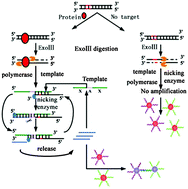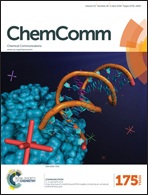Recent advances in transcription factor assays in vitro
Abstract
Transcription factors (TFs) play central roles in the regulation of gene expression through binding to specific DNA sequences, and may influence multiple transcription-associated cellular processes including cell development, differentiation, and growth. Alterations in TF levels may lead to a variety of human diseases. Consequently, rapid and sensitive detection of TFs is crucial to both biological research and clinical diagnostics. However, conventional methods for TF assays are usually laborious and time-consuming with poor sensitivity, and sometimes involve the radioactive materials. To overcome these limitations, some new approaches have been developed with a low detection limit, high specificity, high throughput, and low cost. In this paper, we review the recent advances in TF assays and highlight the emerging trends as well.


 Please wait while we load your content...
Please wait while we load your content...